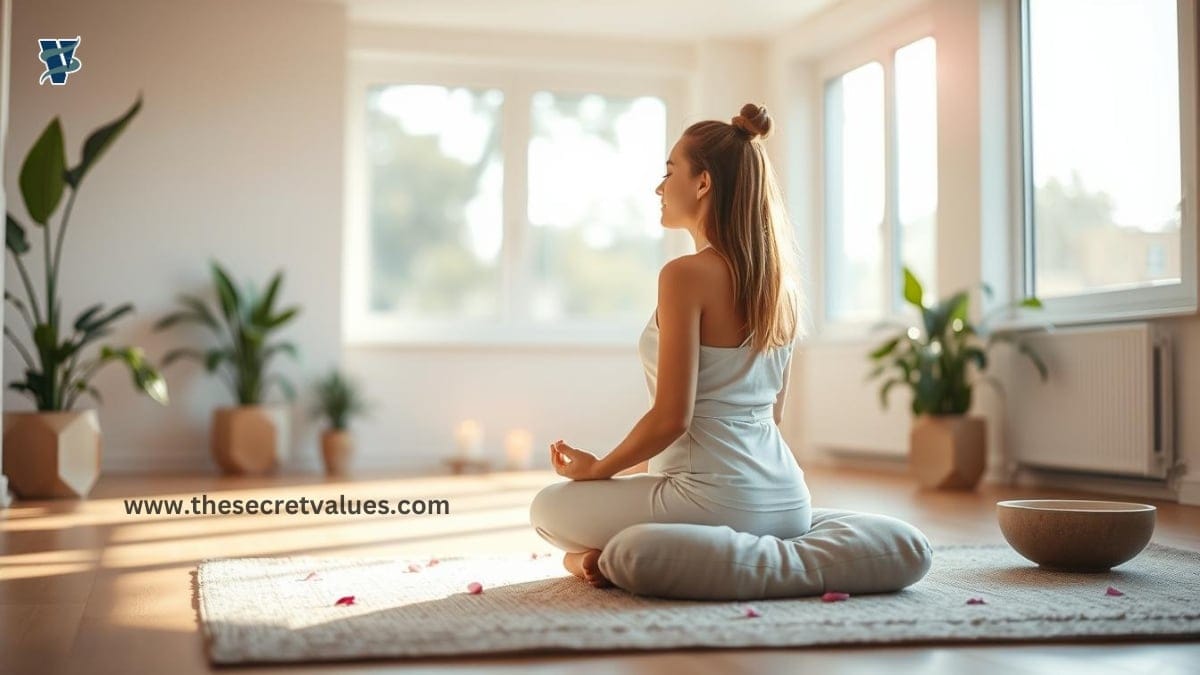Meditation has gained popularity as a method of enhancing mental health—emotional and physical well-being. Many people have discovered they can meditate at home effectively, transforming their daily lives with just a few minutes of practice. So, if you’ve been wondering, “How can I meditate at home?” or “How to do meditation at home,” this article is for you. Let’s explore four powerful reasons why you should start meditating at home today.
Why Meditate at Home?
Meditating at home offers a sense of privacy and comfort that can be hard to achieve in a public or group setting. Home is a safe and comfortable location, making it ideal for deep relaxation and mindfulness.
Meditating in your home allows you to establish a personal practice that fits your unique needs. Whether you prefer to meditate in silence or listen to soothing music, your home is the place where you can genuinely connect with yourself without distractions.
How Can I Meditate at Home?
The question “How Can I Meditate at Home?” is fairly clear. You do not need sophisticated gadgets or a complicated setup to begin meditating. Here are a few easy steps to start your practice:
- Find a quiet space where you can rest comfortably.
- Focus on your breathing, allowing each breath to ground you.
- Start with short sessions (5-10 minutes) and gradually extend as you feel more comfortable.
The beauty of meditation is that it can be done anywhere, but doing it at home gives you complete control over your environment.
How Does Meditation Reduce Stress?
Meditation is known for its profound ability to reduce stress and bring calmness. How does meditation reduce stress? The practice involves focused attention and deep breathing, which helps lower cortisol levels (the stress hormone) in the body.
Meditating gives your body a break from the constant “fight or flight” response that stress triggers. This leads to relaxation and a clearer mind, allowing you to approach challenges with a more centred and balanced perspective.
How to Do Meditation at Home
Now, let’s dive into how to do meditation at home effectively. Here’s a step-by-step guide:
- Sit comfortably: Rest on a cushion, sit in a chair, or lie down. But make sure your back is straight.
- Close your eyes to block out external distractions.
- Focus on your breath: Inhale deeply through your nostril, hold for a moment, then exhale slowly through your mouth.
- Observe your thoughts. If your mind wanders, softly redirect your attention to your respiration without judgment.
This simple yet powerful practice helps you reconnect with yourself and brings peace to your day.
4 Powerful Benefits of Meditating at Home
Meditation at home offers numerous benefits. Let’s break down four key reasons to start your practice today.
1. Increased Focus and Productivity
One of the significant benefits of meditation is enhanced focus. When you meditate at home, you are training your brain to concentrate on one thing—your breath or your mantra. This practice carries over to other areas of your life, helping you stay focused during work, school, or other daily tasks.
By calming your mind, meditation eliminates distractions, allowing you to perform at your best.
2. Stress Relief and Anxiety Management
We all face stress in our lives, but meditation offers a powerful tool to manage it. Regular meditation reduces the symptoms of anxiety, lowers blood pressure, and helps your body relax. Meditation can be particularly beneficial when feeling overwhelmed or anxious about a situation.
How does meditation reduce stress? It helps to calm the nervous system and encourages relaxation that combats stress’s physical and emotional effects.
3. Better Emotional Health
Meditation cultivates emotional stability and interior tranquillity. By engaging in consistent practice, you develop a greater understanding of your emotions and the ability to manage them in a healthy manner. This may result in enhanced relationships and general well-being. Meditation assists in maintaining a sense of calm and awareness, decreasing the likelihood of overreacting in challenging circumstances.
4. Enhanced Physical Health
Although meditation is primarily recognized for its mental advantages, it also has physical benefits. Studies show regular meditation can improve sleep quality, reduce pain perception, and boost the immune system.
Additionally, meditation has been shown to lower reducing tension and lowering blood pressure to reduce the risk of heart disease.
Tips for Creating a Meditation-Friendly Space at Home
The space where you meditate can significantly impact your experience. To make your home a conducive environment for meditation, follow these tips:
- Choose a quiet spot free from distractions.
- Make it comfortable: Use cushions, blankets, or any additional items that would enhance the ambience of your seating area.
- Limit distractions: Turn off your phone or put it in another room.
- Add calming elements: Consider lighting candles, using essential oils, or playing calming sounds to enhance the atmosphere.
Methods for Maintaining a Regular Meditation Routine
Starting a meditation practice is simple, but maintaining consistency can be difficult. Here’s how to establish a routine:
- Start with bite-sized sessions: Ease into meditation by committing just 5-10 minutes each day.
- Create a consistent ritual: Pick a regular time to meditate, so it becomes a part of your daily routine.
- Be kind to yourself: It’s normal for your mind to wander—just gently bring your focus back without judgment.
- Keep track of your journey: Write down your experiences in a journal or use an app to see how far you’ve come.
Conclusion: Start Meditating Today
Now that you know the benefits and the steps to meditate at home, it’s time to start your practice. Whether you’re seeking stress relief, emotional health, or physical benefits, meditation at home provides a simple yet powerful way to improve your life.
Start meditating today and experience the transformative power of mindfulness in your own home.
FAQs:
- How long should I meditate at home each day?
- Get in 5 to 10 minutes daily and work your way up as you get more comfortable. get more comfortable.
- Can meditation help with stress?
- Meditating helps alleviate stress by reducing cortisol levels and calming the mind.
- What is the best time to meditate at home?
- Morning or evening is ideal when you can sit peacefully without distractions.
- Can beginners meditate at home without guidance?
- Yes, beginners can start by following simple techniques and gradually improving their practice.
- How do I make meditation a daily habit at home?
- Consistency is key. Set a regular time and be patient as you build your practice.








2 thoughts on “Meditate at Home: 4 Powerful Reasons to Start Today”